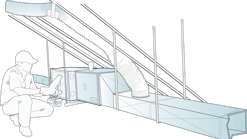Right at this moment, exactly where are each of your vehicles and each of your field employees? Are they stuck on the side of the road—or about to be? Could that have been prevented? And how will customers react when appointments get rescheduled?
Roughly half of the contractors reading this article no longer sweat those kinds of questions. Rest of them do. That’s one key finding from a July 2019 survey of EC&M, Contracting Business and Contractor subscribers. The goal: Find out why, how and how many firms are using field service management software to manage the productivity and safety of their employees, vehicles and other high-value mobile assets.
Forty-nine percent of the 529 respondents to the above-mentioned survey said they use field service management software for real-time information about the location of their vehicles. Forty-six percent also use this software for real-time information about their field employees, such as location and status.
As the survey found, this information enables a wide variety of business benefits, including greater productivity, lower capital and operating expenses, and a more positive brand reputation among customers and general contractors. All of these benefits can provide a competitive edge and enable greater market differentiation.
No More Phone Tag
A savvy field service management software can tell you the precise location of your vehicle, equipment or employee. 57% of survey respondents agreed that this information is critical understanding time on each task. Fifty-four percent agreed that it would be difficult to provide customers with ETAs. Roughly the same amount said they’d struggle to retask employees and high-value assets based on proximity to another job site.
A field service management solution not only provides that information, it does it in a way that’s more efficient than the alternatives of calling and texting employees, and then waiting for a response. How long does that take? Twenty-six percent of survey respondents said they get a response within an hour, while 51 percent said it takes a few minutes.
With field service management software, fleet managers can save all this precious time. They can easily retrieve the location on a user-friendly interface on their mobiles, tablets or desktops.
Accurate, up-to-the minute location information also helps address scheduling inefficiencies, which ranked as the No. 3 overall business challenge overall. In fact, 19 percent of respondents said scheduling inefficiencies are their top challenge.
For example, Verizon Connect eliminates common problems such as juggling multiple staff calendars and having field employees manually update their status. Instead, dispatchers, supervisors and other managers simply check a single screen to see which employees are available. When managers create or update job information, that information is instantly and automatically pushed out to assigned employee’s mobile app.
One example is Bill Howe, a plumbing, HVAC, restoration and flood services company serving the San Diego area. It uses Verizon Connect’s Live Map feature and GPS tracking so employees are dispatched and routed more efficiently, and thus provide faster service to customers.
“It helps us stay in front of our guys 24/7,” says Tina Howe, vice president.
Safety First
Employee safety is a top concern for nearly all employers. That’s true for any business, but it’s even more critical for mechanical, electrical and plumbing companies. One reason is because skilled people are in chronically short supply, making it difficult to find a new employee to cover for an injured one who’ll be out for weeks or months.
The survey identified a second reason: service technicians often work alone, sometimes at remote job sites. In fact, 54 percent of respondents said lone workers are their No. 1 safety challenge. Twenty-seven percent said that without real-time information about each field employee’s location, they can’t quickly and easily determine whether an incorrect location suggests an injury.
Employees are also susceptible to injuries while in transit. This highlights another benefit of being able to monitor vehicles anytime, anywhere. Twenty-three percent of respondents said they don’t have alerts and other real-time information about vehicle accidents — all of which are available with a field service management solution.
Some Benefits Trigger Additional Benefits
Of course, the ideal is to avoid accidents in the first place. But that’s easier said than done. In fact, the No. 2 safety challenge was not being able to track employee driving habits, such as hard braking and hard cornering.
A field service management solution helps with that, too. It can provide weekly reports and instant alerts about unsafe driving habits. This enables businesses to identify which drivers need coaching and in which aspects. One example is Bill Howe. The year before it started using Verizon Connect, it had 16 accidents totaling nearly $1 million in damages. The next year, it had just two.
This benefit often triggers additional benefits, starting with reduced insurance premiums. For example, Boston-based Paul Davis Restoration used Verizon Connect to get a 40 percent reduction in its premiums, which at the time were running about $70,000-$80,000 a year.
A second benefit is reduced vehicle downtime and maintenance. Harsh braking and cornering prematurely wears out components such as brakes, steering and suspensions. Consider your current maintenance and downtime costs if you’re on the fence about whether to invest in a field service management solution.
A third benefit involves accidents that never actually occurred. Every contractor has had a caller claim, “One of your vans dented my fender.” A field service management solution makes it quick and easy to determine whether any company vehicles were near the caller’s location at that time. If they weren’t, the burden of proof is now on the caller. Beating fraudulent claims also helps keep insurance premiums in check.
Which Truck is About to Run Out of Oil?
Accidents aren’t the only reason why vehicles go out of service. Another is when a water pump fails or an oil pump starts to leak. So, it’s no surprise that asset maintenance was the No. 1 business challenge for 8 percent of respondents, and No. 2 for another 12 percent.
Many firms let employees take their vehicles home each night, making it likely that their oil, antifreeze, tires and other vital systems won’t get checked on a regular basis. A field service management solution can connect to the OBD II port that virtually every vehicle has on board. Operators can now monitor every system and catch problems before they result in expensive, extensive downtime.
For example, before deploying Verizon Connect, Bill Howe lost a truck after it ran out of oil. Now drivers get a reminder whenever their vehicle is approaching a service interval. The company also gets alerts about unscheduled maintenance, such as a failing torque converter — something that a driver wouldn’t notice and that wouldn’t show up on a dashboard gauge. By accessing diagnostic trouble codes for the powertrain, brakes, lighting and other key systems, companies can catch problems as they’re emerging rather than when the vehicle is stranded on the side of the road. That’s one more way that a field service management solution helps contractors maximize the productivity of their vehicles and the people who use them.
Sponsored By:












